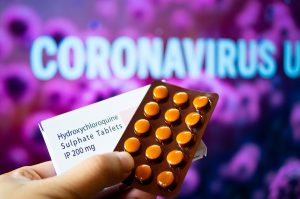A new study’s result is malaria drug hydroxychloroquine not effective against Covid-19 coronavirus. Some time ago Donald Trump suggested that the malaria drug, hydroxychloroquine would be effective for Covid-19 coronavirus patients in treating them when hospitalized. This prompted several clinical trials, because there was no data base for the use of hydroxychloroquine in the treatment of infectious diseases. However, a good data base existed already for the use of hydroxychloroquine as an immune modifier. This is important for the treatment of autoimmune diseases like rheumatoid arthritis or lupus.
Two smaller trials concluded that there was a marginal effect in favor of using the malaria drug. There were built-in problems with these studies. But now the much larger trial from the UK with the name of “UK Recovery trial” has unequivocally shown that there was no favorable effect of hydroxychloroquine in the treatment of Covid-19 coronavirus.
UK Recovery trial
The University of Oxford ran the trial and the results went to the World Health Organization. More than 11,000 patients with Covid-19 took part in the trial. 1,542 patients were taking the drug hydroxychloroquine. The others served as controls. 25.7% of patients who took hydroxychloroquine were dead 28 days after start. 23.5% of the controls who received standard treatment only were dead after 28 days. When the figures were out, the research team stopped treatment with hydroxychloroquine. When researchers added this drug, there were 1.2% more deaths! As a result of this study the FDA decided on June 16, 2020 to revoke its emergency use authorization for the drugs hydroxychloroquine and chloroquine for the treatment of Covid-19.
Use of hydroxychloroquine for rheumatic diseases
In a 2016 US study patients with rheumatoid arthritis were either treated with hydroxychloroquine or only with standard therapy. There were 1266 total patients and the observation time was from January 1, 2001, to October 31, 2013. 547 patients were hydroxychloroquine users, the rest served as controls. The use of hydroxychloroquine led to a 72% reduction in mortality from cardiovascular complications (heart attacks and strokes).
There is no question that there is a place for hydroxychloroquine as an immune modulating drug in rheumatology. But this drug is definitely not useful in Covid-19 coronavirus infections.
Side effects of hydroxychloroquine
There is a whole laundry list of side effects that people can get from hydroxychloroquine. There is nausea, headaches, stomach pains, diarrhea, loss of appetite, dizziness, blurred vision and mood changes that they could get. In addition, you may experience muscle weakness, loss of balance, light sensitivity, bleeding, confusion, seizures and others. Before you assume it is safe to take hydroxychloroquine, inform yourself more about the potential side effects.
Conclusion
The malaria drug, hydroxychloroquine did not show any beneficial effect in a clinical trial involving 11,000 patients with Covid-19 coronavirus infections. 1,542 patients of them were taking the drug hydroxychloroquine. 25.7% of patients who took hydroxychloroquine were dead 28 days after the start. 23.5% of the controls who received standard treatment only were dead after 28 days. There definitely was no advantage of taking hydroxychloroquine with a Covid-19 coronavirus infection. On the other hand, in a 2016 study a group of patients with rheumatoid arthritis received hydroxychloroquine. The use of hydroxychloroquine led to a 72% reduction in mortality from cardiovascular complications (heart attacks and strokes) in a period of more than 12.5 years. The decision of whether hydroxychloroquine is useful in a patient needs to stay in the hands of the treating physician. Arbitrary use is not only questionable, but can amount to serious health hazards.







